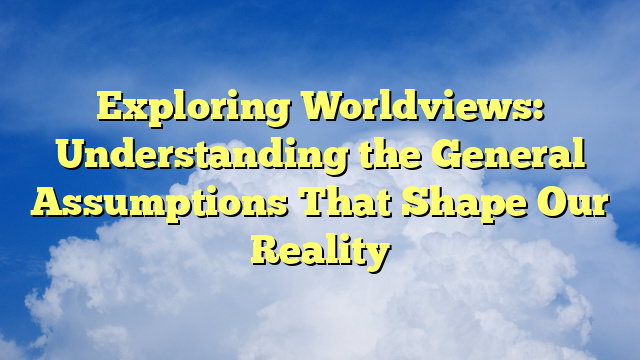Exploring Worldviews: Understanding the General Assumptions That Shape Our Reality
Exploring Worldviews: Understanding the General Assumptions That Shape Our Reality
Worldviews are the fundamental cognitive orientations of an individual or society encompassing the entirety of the individual or society’s knowledge and point of view. A worldview can include natural philosophy; fundamental, existential, and normative postulates; or themes, values, emotions, and ethics. The concept is a framework through which individuals interpret the world and interact with it. Understanding the general assumptions that shape our reality is crucial for fostering empathy, enhancing communication, and navigating the complex web of human beliefs and behaviors.
What is a Worldview?
A worldview is a set of beliefs about fundamental aspects of Reality that ground and influence all one’s perceiving, thinking, knowing, and doing. It can be thought of as a mental model of reality—a comprehensive framework of ideas and attitudes about the world, ourselves, and life, a system of beliefs, a system of personally customized theories about the world and how it works. With roots in philosophy, religion, and science, worldviews are the lenses through which people see the world.
Components of a Worldview
- Metaphysics: Deals with questions about what is really real.
- Epistemology: Concerns the nature and scope of knowledge and what we can know.
- Axiology: Involves values, ethics, and aesthetics.
- Anthropology: The study of humanity, including the nature of human beings.
- Theology or Philosophy: Concerns the existence of God or the nature of existence, reality, and the universe.
Types of Worldviews
Worldviews can be broadly categorized into religious, philosophical, cultural, and scientific types. Each type provides a different lens through which to interpret the universe and our place within it.
Religious Worldviews
Religious worldviews are based on the teachings of religious texts and spiritual experiences. They often address questions of existence, purpose, and morality through the lens of divine revelation and faith.
Philosophical Worldviews
Philosophical worldviews rely on reason and critical thinking to explore the nature of reality, existence, and knowledge. They often seek to understand the principles underlying human thought and the structure of the universe.
Cultural Worldviews
Cultural worldviews are shaped by the shared history, language, traditions, and practices of a community. They provide a collective lens through which members of the community interpret their experiences and the world around them.
Scientific Worldviews
Scientific worldviews are based on the scientific method and empirical evidence. They prioritize observable, measurable phenomena and the laws of nature as the basis for understanding the universe.
How Worldviews Shape Our Reality
Worldviews influence every aspect of human life, from our perceptions of right and wrong to our decisions about personal and societal issues. They shape our responses to the environment, to each other, and to the challenges we face in life.
Influencing Perception and Interpretation
Our worldview acts as a filter for our perceptions, determining what we notice, how we interpret what we see, and how we conceptualize our place in the world.
Guiding Behavior and Decision-Making
The assumptions and beliefs inherent in our worldview guide our behavior and decision-making processes, influencing our choices and actions in both subtle and significant ways.
Impacting Communication and Relationships
Worldviews affect how we communicate and relate to others. Understanding the worldview of others can enhance empathy, reduce conflict, and foster more meaningful connections.
Challenging and Expanding Our Worldviews
Encountering different worldviews can challenge our assumptions and prompt us to reconsider our own beliefs. This process of reflection and adaptation can lead to a more nuanced and comprehensive understanding of the world.
Engaging with Diverse Perspectives
Actively seeking out and engaging with perspectives that differ from our own can broaden our understanding and appreciation of the complexity of human experience.
Reflecting on Our Assumptions
Reflecting on the assumptions underlying our worldview can reveal biases and limitations in our thinking, opening the door to personal growth and development.
Adopting a Growth Mindset
Adopting a growth mindset allows us to view challenges to our worldview not as threats, but as opportunities for learning and expansion.
Conclusion
Worldviews play a crucial role in shaping our perceptions, behaviors, and interactions with the world and with each other. By understanding and reflecting on the general assumptions that shape our reality, we can foster a more empathetic, inclusive, and open-minded society. Engaging with diverse perspectives and challenging our own assumptions are essential steps in this ongoing process of understanding and growth.

